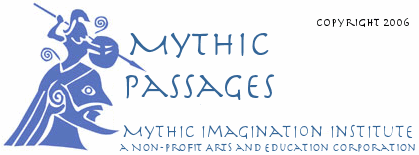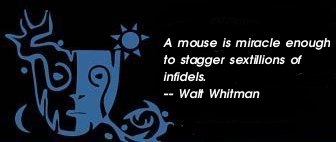|

The Way Things Are:
Conversations with Huston Smith on the Spiritual Life.
Edited and preface by Phil Cousineau.
Berkeley: University of California Press, 2003.
314pp. $24.95 cloth
Reviewed by Dennis Patrick Slattery, Ph. D.

Dennis Patrick Slattery, Ph.D. is Core Faculty, Mythological Studies, Pacifica Graduate Institute.
The author of over 225 articles on culture, psychology and literature, as well as author of 7 books,
his most recent is entitled Grace in the Desert: Awakening to the Gifts of Monastic Life
(Jossey-Bass, 2004), which describes a spiritual pilgrimage staying in 12 monasteries and Zen Buddhist
centers in the United States over a three and a half month sojourn. He was also a presenter at
Mythic Journeys 2004, and he will present a lecture and workshop on February 17 and 18,
2006, for the C.G. Jung Society of Atlanta, a partner of the Mythic Imagination Institute.

Religion is a messy business, but somebody has to handle it. That thought kept chasing me through every interview that this
volume contains. The Way Things Are follows his earlier book, Why Religion Matters, which quickly became a best
seller, surprising no one more than Smith himself. This new collection of interviews and conversations, as well as a few insightful essays
by Smith's friend and collaborator, Phil Cousineau, helps readers orient themselves to Smith's large concerns over the past 50 years,
the harvest of a life's work.
Divided into 22 chapters, the book breaks into three well-organized clusters: "The Heart of Religion"; "The Struggle Between
Science and Religion"; and "From Plato's Cave to the Enchanted Garden." Dominated primarily by interviews from a variety of sources
spanning decades, they also include essays by Smith himself, as well as essays about him and his work. For me, Smith stands with figures
like Joseph Campbell (whom he knew well) in comparative mythology, Carl Sagan in astrology, Barbara Tuchman in history (A Distant Mirror),
Karen Armstrong (The History of God) and Elaine Pagels in theology. These figures are great synthesizers, who write with
compassion and a deep encyclopedic knowledge of their discipline as they tap us on the shoulder and say, in effect: "Yes, all these
particulars are important, but don't forget the big picture. Here it is for you to consider."
Born of missionary parents who were stationed in China, Smith went on to study at the University of Chicago and to teach at
many prestigious universities in the United States. While comfortable within the Christian tradition, Smith is an avid supporter of all the
world's wisdom traditions that offer up, in spite of their imperfections and even intolerances, a perennial philosophy that is as valuable
to study and live by now as it was when formed out of earlier world cultures. At the heart of all religions, which share, as Joseph Campbell
believed myths also do, a common unifying principle, Smith believes is "a longing for ultimate meaning." The promise of the fulfillment of
this longing for meaning is at the heart of religion. More than once in the various conversations Smith uses the metaphor that the world's
religions are like fingers pointing toward the moon, the ultimate transcendent reality. He cautions against taking the pointing fingers for
the moon itself. Religious traditions are guides to an ultimate reality; they are not the thing itself. Sometimes, especially in times of religious
conflict and chest-thumping, that distinction becomes hidden.
Another recurrent image Smith uses is that there exists "a conceptual spine that unites religions of the world," as a spine holds up all
the diverse physiques of human beings. While invisible as a presence, nonetheless, the spine allows things to stand, to have shape and form.
Without that invisible structure, the body would collapse. By the same token, if the world's religious traditions are lost, "then important structural
shapings of the spirit will be lost" as well. He agrees with other writers that "if we lose our traditions we will have no world at all."
In fact, that spine has weakened considerably, according to Smith, in today's postmodern western world, wherein not science but
scientism has replaced religion and colonized our way of perception. Scientism is most potently embodied today in the controlled laboratory
experiment, where matter's visibility is explained, quantified, measured and manipulated. Scientism rests principally on the absolute reliability
of fact and objective reality; it is analytic, objective and distant. Smith fears that it not only dominates all study at the university today, but
it has a more insidious side-effect. In scientism is a belief that only what can fall under its purview, control, or measurement has validity.
Subjectivity is then thrown out as an unwanted way of knowing, and with it, art, poetry, history, spirituality—all of those very real
and valid dimensions of the human heart and spirit that can guide one towards wisdom. Scientism is incapable of passing judgment on value,
on worth, yet these are areas in need of nurturing as well for the human spirit. Incapable of measuring these areas, scientism trivializes or
debases them as a way of knowing. A gullible populace, without clear and critical modes of thought to help them see into this all-pervasive
mythos, can be duped into believing that, yes, there are no other valid claims to knowing that are worth considering. At the heart of all of
Smith's thinking on religion and science, this is his greatest fear and most repeated concern.
What his life work reveals is that religious experience is "no less real," and that it is fascinating to track the revelations stemming from
quantum physics, which are couched in language that is so close to the language of mystics that one could almost substitute for the other.
What Smith laments is that an old and outmoded Newtonian world view is still held in high regard, even while physics and constructive
theories growing from a post modern imagination have already replaced them.
Huston Smith's beliefs, sentiments and concerns emerge from a courageous soul who has devoted his life not just to the study of religion,
but also to history, philosophy, literature and the arts. His vision is panoramic, even epic; he is not a zealot, yet he exhibits a passion and a
compassion for the world's confusion, which he refers to more than once as "this pigsty of a world." Yet his thought exhibits a true love for
the ways of the world, along with a nuance, a subtlety, a shading that is worth any concerned citizen's attentiveness. These conversations
made me pause, reflect, write down my own thoughts on his insights, and argue with him at several points. But in over 300 pages I never lost
interest.
What he enjoins and challenges all of us to do is pay attention, deeply, and with love, so that our individual visions can be cleansed, to
expose the way things are. In such a moment, in the fullness of time, "knowing and being become identical."
Read an excerpt from The Way Things Are:
Conversations with Huston Smith on the Spiritual Life.
Return to Passages Menu
Subscribe to the Passages e-newsletter
|

